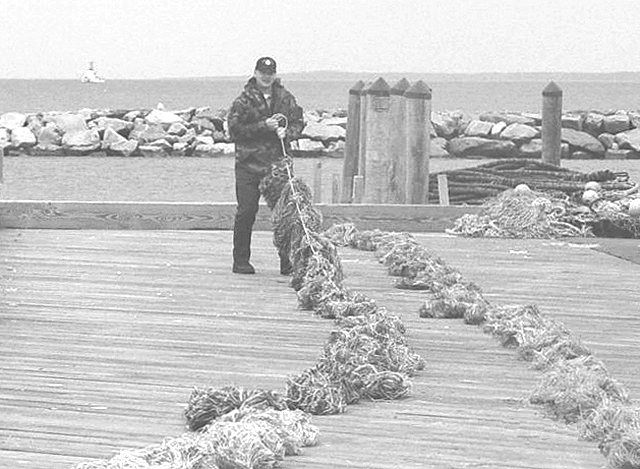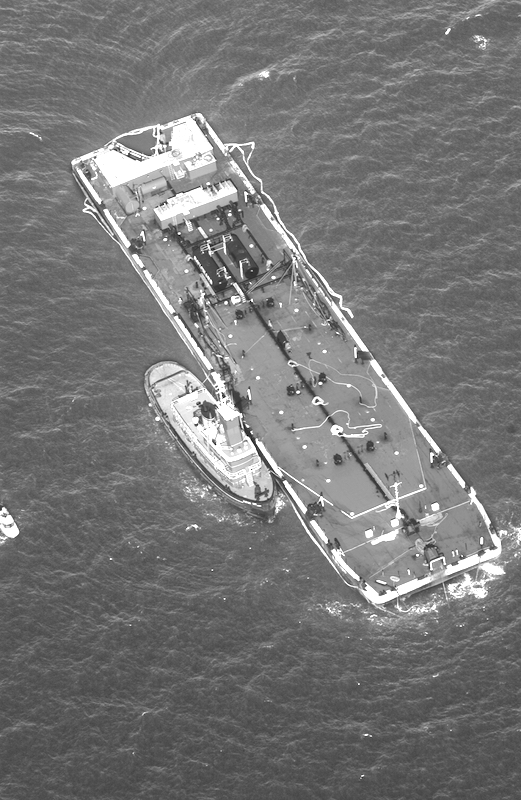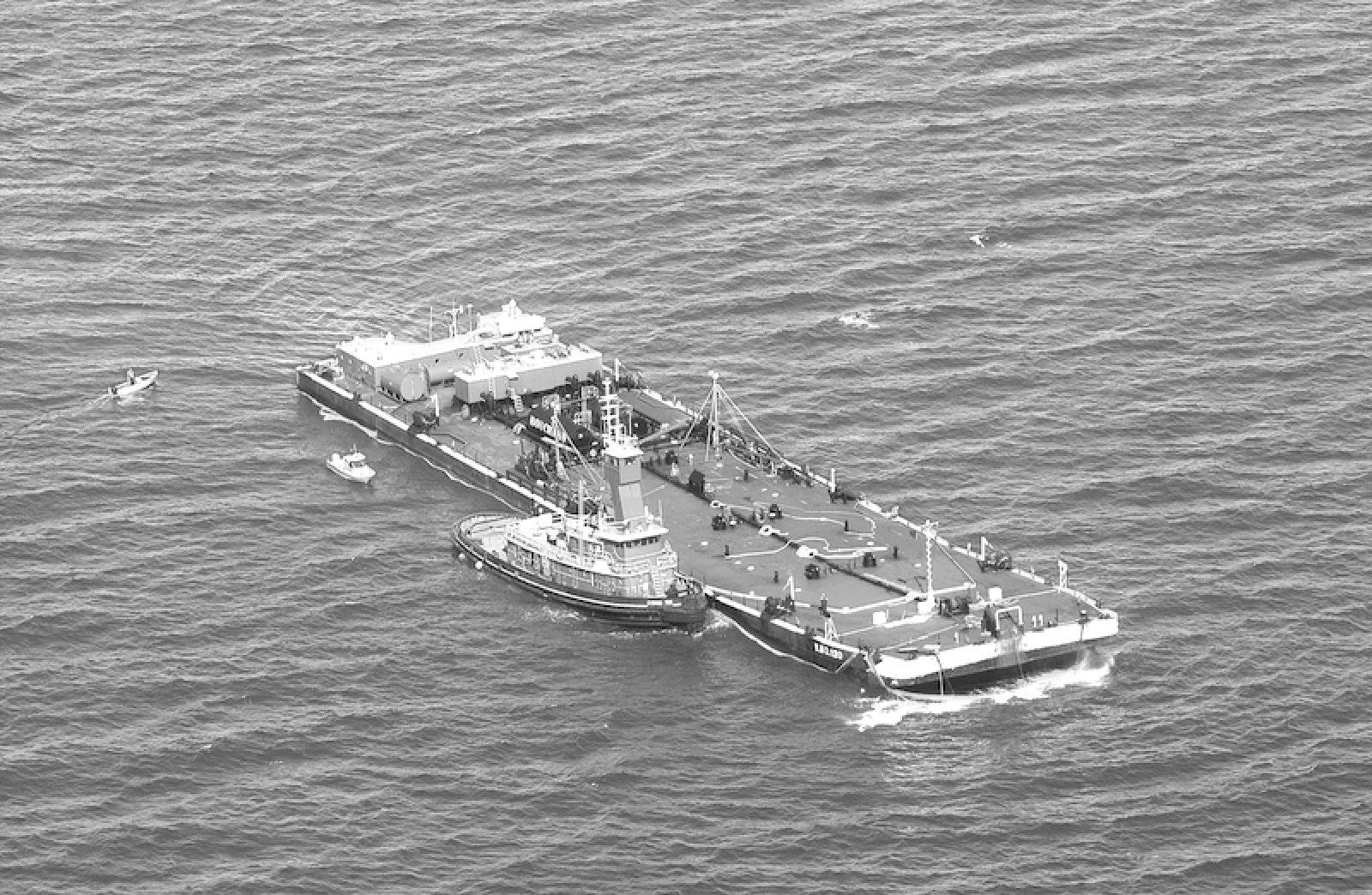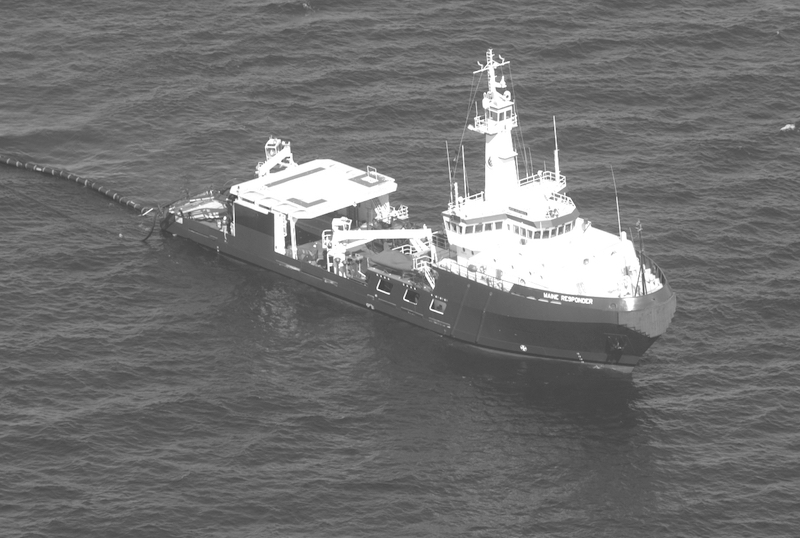Prevailing winds so far have helped the Vineyard escape any real environmental impact from an oil spill Sunday that dumped almost 15,000 gallons into Buzzards Bay, killing at least five waterfowl and polluting more than 10 miles of mainland beaches along the bay.
Chunks of oil the size of hockey pucks were spotted in Vineyard Sound near the Elizabeth Islands, prompting Dukes County officials to declare a state of emergency Wednesday, but none of the oil has yet washed ashore on any Island beaches.
"We don't expect that it will reach as far as the Vineyard," a Coast Guard spokeswoman told the Gazette yesterday. "The oil has been contained, boomed and skimmed."

But not all the oil stayed in the bay. Tuesday morning, Vineyard Haven harbor master Jay Wilbur along with Mike Syslo, director of the state lobster hatchery, and Derek Cimeno, Tisbury shellfish constable, took an excursion into the Sound and spotted small patches of oil near Robinson's Hole.
"It was very sparse. We saw three-foot slicks," Mr. Syslo told the Gazette.
Island shellfish wardens and environmental police are now keeping a close watch, especially at the openings to Menemsha Pond and Lake Tashmoo, which would be particularly vulnerable if exposed to the drifting fuel oil, which started gushing Sunday from a 12-by-two-foot hole in a barge headed to the Mirant Electric Plant in Sandwich.
"If this oil gets into Menemsha Pond it could be a disaster for all the shellfish in the pond," said Rob Garrison, manager of the Wampanoag tribe's shellfish hatchery in Aquinnah, who attended an emergency meeting of county and Island environmental officials Wednesday afternoon.
The spill was the worst in Buzzards Bay in a quarter century and while the leakage has now been contained by both federal and private cleanup efforts, the incident is being viewed as a loud wake-up call to Island environmental officials. The barge was just four miles west of Woods Hole.
"It certainly opened our eyes to the lack of equipment on the Island to combat this," Oak Bluffs shellfish constable David Grunden told the Gazette yesterday.

"The last time we revised our contingency plan for an oil spill was in 1991, and the only equipment we had on the Island was in a small response trailer at the Menemsha Coast Guard Station."
Acting county manager Dianne Powers helped explain what's at stake on the Island. "The loss of incomes and destruction of hatcheries, shellfish and related industries would negatively impact the community as an entirety and the fishing industry in particular," she wrote in her statement Wednesday declaring a state of emergency.
In essence, the Vineyard got a taste this week of just how vulnerable it is to an industry that is largely invisible to Islanders - the shipping of oil through Buzzards Bay and up the Cape Cod Canal. Roughly 1.6 billion gallons of fuel are shipped annually through this area, a stretch of water that maritime experts say is unforgiving to navigational mistakes.
The Coast Guard is currently investigating the cause of the accident and will determine whether the barge captain may have strayed off course and run the barge over an outcropping of rocks at the entrance to Buzzards Bay. Divers quickly spotted a 12-foot gash in the starboard tank of the barge, which draws 32 feet in depth.
The barge, owned by Bouchard Transportation Co. of New York, was carrying more than 850,000 gallons of No. 6 fuel oil.
The spill was initially massive, extending to nearly 20 square miles. Cleanup efforts were in swing by late Monday as the barge company dispatched a second barge to offload the oil and the Coast Guard sent a cutter from Newport, R.I., with special booms to contain the spill.
The cutter Ida Lewis is equipped with a new skimming system, but a press release from the Coast Guard yesterday stated that weather conditions have hampered efforts to use the new technology.
"The cutter will remain on the scene as long as necessary," the Coast Guard said.
The spill sparked a massive response on the mainland as Coast Guard helicopters circled over the bay and the state Division of Fisheries and Wildlife assessed the damage to marine life. So far, four loons and one duck have died, but other waterfowl have also been oiled and taken to a New Bedford zoo for treatment.
The National Oceanic and Atmospheric Administration and the state Department of Environmental Protection are also monitoring the response and cleanup of the oil.
While response efforts are centered on Buzzzards Bay and the mainland beaches, the posture on the Vineyard has been decidedly more defensive. Sgt. William L. Searle with the state environmental police used his state contacts to order 30 bales of a special boom material called snare boom that can contain oil spills. That material arrived on the Island late Wednesday afternoon.
Aquinnah and Chilmark were among the first to pick up the material.
On Thursday morning, Aquinnah selectman Carl Widdiss along with Bret Stearns and Jeff Day from the Wampanoag tribe set up a system on the Aquinnah side of the Menemsha channel.
Chilmark harbor master Dennis Jason and town executive secretary Tim Carroll unpacked the bale at the floating dock. "We have them there ready when needed," Mr. Carroll said yesterday.
Officials at the Wampanoag tribe's hatchery are taking measures to protect their investment in 930,000 oysters they are growing in Menemsha Pond.
"We will put oil booms around [our shellfish beds]," said Mr. Garrison. "Our reputation is basically based on the fact that our water is pristine or near-pristine here. People are not going to be eating Cape Cod shellfish for awhile. This is unfortunate."
Rick Karney, director of the Martha's Vineyard Shellfish Group, shared the concern over the long-term economic impact from Sunday's spill. "It will definitely hurt the market for shellfish and fish for a short period of time," he said.
Warren Doty, the Chilmark selectman who owns a wholesale seafood business operating out of Vineyard Haven, said: "Everyone is worried about the oil. Even a small blob of tar in your net, it can ruin everything in the net."
With the squid fishery season about to begin in Vineyard Sound, Mr. Doty added, "Even a thin coating of oil makes the fish inedible. Thank God it wasn't a huge spill. It has the potential of ruining our fishing industry for a year or two."
Gazette reporter Mark Alan Lovewell also contributed to this story.








Comments
Comment policy »